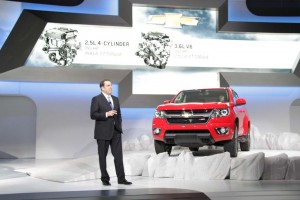
GM North America President Mark Reuss reveals the new Chevrolet Colorao during last month's LA Auto Show.
It was the perfect opportunity to reach Hollywood’s elite, a mix of celebrities gathered for a preview screening of the new film, Llewyn Davis, at the Arc Light Theater on Sunset and Vine. To get to the afterglow party, the celebrities found themselves walking through a gauntlet of new Lincoln MKZ sedans, where they were handed bags full of chocolates and other goodies – all part of the“Lincoln reimagined” project.
Struggling for its very survival, the Ford Motor Co. luxury brand is reaching out to opinion leaders as it rolls out new products like the MKZ and the compact MKC crossover due to market next year. It’s putting a particularly heavily emphasis on those in California – and it’s not alone. Cross-town rivals General Motors and Chrysler are also making aggressive efforts to win over California buyers, as they made clear with their strong presence at last month’s big Los Angeles Motor Show.
Gaining ground in California “is critical” for Detroit’s Big Three, says Art Spinella, chief analyst at CNW Marketing. With a population of 38 million, it is home to one in eight Americans who are seemingly always on the road. It’s not only the single-largest regional market in the country – and bigger than all of Canada – but, Spinella stresses, but the Golden State has traditionally had a disproportionate influence on American trends.
A look back at industry sales numbers show that Japanese manufacturers like Toyota, Honda and Nissan got their first solid foothold in California. And today, it’s they, not GM, Ford and Chrysler, who are seen as the home-town brands.
Collectively, Detroit makers hold a miniscule 27.8% share of the state’s new car market compared with a national average of 45.2%, according to industry sales numbers. Honda holds a bigger market share than Ford – 13.5% compared to 11.2%, with GM lagging at 10.3% and Chrysler a miniscule 5.3%.
(Check out the new Chevy Colorado. Click Here.)
For decades, the domestics took that as a cue to largely ignore California as a write-off, but emerging from the economic crisis of 2008 to 2010 – during which GM and Chrysler both struggled through bankruptcy – the Detroit makers can no longer rely solely on their strongholds in Middle America. Indeed, officials like Tim Mahoney, the marketing chief at Chevrolet, believe that if they can’t gain ground on the Left Coast, they probably will see the imports escalate their own assault on the heartland markets.
“It’s time for the brand perception to catch up out here,” Mahoney said, following the preview of the maker’s new Colorado pickup at the L.A. Auto Show.
(Auto inventories bulging – will a price war follow? Click Hereto find out.)
The compact truck is part of a wave of new products GM has introduced in recent months – many of them gaining strong reviews from influential third-party sources, such as Consumer Reports magazine, which dubbed the new Chevy Impala the best sedan it has ever tested. Nonetheless, Mahoney admitted “It’s going to take time” to win over California’s import-loyal buyers.
But there are some signs that the window is opening for Detroit makers collectively. Nationally, Ford posted a solid 51% gain in sales of its stylish Fusion sedan in November – but the numbers jumped a full 51% in California.
(Want the first 2015 Mustang? Be prepared to write a big check. Click Here for the story.)
Surprisingly, GM’s Buick brand is gaining momentum in the state, especially among the growing Asian population. Analysts suggest that may reflect the fact that Buick has become one of the strongest brands in China.
And while they still lag behind “green” car leader Toyota, Detroit’s various hybrid, plug-in and battery-electric models are showing their strongest momentum in enviro-friendly California, according to recent sales figures.
Those products are proving particularly popular with younger Californians where “there’s a lot of motion between brands,” suggests analyst Spinella. CNW research indicates that only 20% of the state’s car buyers over 45 are likely to switch brands, but that more than doubles to 42% among younger motorists. And the younger they are, the less loyal they become.
Ironically, where Baby Boomers switched from domestics to imports, that same generational pattern is repeating itself among Millennials.
“They don’t want to be seen driving the same cars as their parents – which in this case was likely a Toyota,” or some other Asian import. Nonetheless, Spinella warns that it’s going to be a “tough nut” to crack into California’s market.
Chevy’s Mahoney agrees. “It’s going to take a steady drumbeat” of creative marketing, backed up by more appealing product, and a lot of patience.
This story first appeared on NBCNews.com
